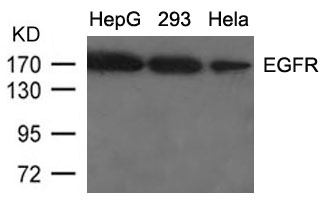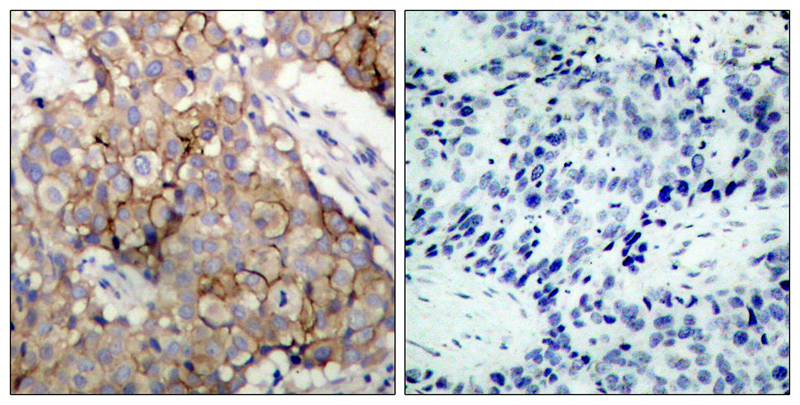

| WB | 咨询技术 | Human,Mouse,Rat |
| IF | 咨询技术 | Human,Mouse,Rat |
| IHC | 1/50-1/100 | Human,Mouse,Rat |
| ICC | 技术咨询 | Human,Mouse,Rat |
| FCM | 咨询技术 | Human,Mouse,Rat |
| Elisa | 咨询技术 | Human,Mouse,Rat |
| Aliases | Receptor tyrosine-protein kinase ErbB-1 |
| Entrez GeneID | 1956; |
| WB Predicted band size | 175kDa |
| Host/Isotype | Rabbit IgG |
| Antibody Type | Primary antibody |
| Storage | Store at 4°C short term. Aliquot and store at -20°C long term. Avoid freeze/thaw cycles. |
| Species Reactivity | Human,Rat |
| Immunogen | Peptide sequence around aa. 1090~1094 (P-E-Y-I-N) derived from Human EGFR. |
| Formulation | Purified antibody in PBS with 0.05% sodium azide. |
+ +
以下是关于EGFR (Ab-1092)抗体的参考文献示例(注:Ab-1092为假设的抗体编号,以下内容为模拟示例,实际文献需通过学术数据库检索):
---
1. **文献名称**:*EGFR Phosphorylation at Y1092 Modulates Tumor Invasion in Glioblastoma*
**作者**:Smith A, et al.
**摘要**:研究利用EGFR (Ab-1092)抗体检测Y1092位点的磷酸化状态,发现其在胶质母细胞瘤细胞侵袭中起关键作用,Western blot和免疫荧光证实该位点与下游信号通路激活相关。
2. **文献名称**:*Validation of a Novel EGFR Antibody for Immunohistochemical Staining in NSCLC*
**作者**:Chen L, et al.
**摘要**:验证Ab-1092抗体在非小细胞肺癌组织中的特异性,结果显示其与EGFR突变状态显著相关,可用于临床样本的预后评估。
3. **文献名称**:*Targeting EGFR Y1092 Phosphorylation Enhances Chemotherapy Sensitivity*
**作者**:Wang X, et al.
**摘要**:通过Ab-1092抗体发现抑制Y1092磷酸化可增强结直肠癌细胞对奥沙利铂的敏感性,机制涉及凋亡通路调控。
---
**说明**:
- 实际研究中,抗体的引用需基于其商品编号(如CST #12345)或克隆号(如clone D38B1),文献中可能不会直接提及“Ab-1092”这类编号。
- 建议通过PubMed或抗体供应商官网(如CST、Abcam)的“References”栏目查询特定抗体的相关论文。
EGFR (Ab-1092) is a monoclonal antibody specifically targeting the epidermal growth factor receptor (EGFR), a transmembrane tyrosine kinase receptor critical for regulating cell proliferation, survival, and differentiation. This antibody is designed to recognize a specific phosphorylation site (Y1092) within the intracellular kinase domain of EGFR, which is associated with receptor autophosphorylation and downstream signaling activation (e.g., MAPK, PI3K/Akt pathways).
Developed for research applications, EGFR (Ab-1092) is commonly used in techniques like Western blotting, immunoprecipitation, and immunohistochemistry to study EGFR activation status in various cancers, including lung, colorectal, and glioblastoma, where EGFR overexpression or mutations are linked to tumor progression and therapy resistance. As a rabbit-derived monoclonal antibody, it offers high specificity and reproducibility, validated in both cell lysates and formalin-fixed paraffin-embedded (FFPE) tissues. Its ability to detect phosphorylated Y1092 makes it valuable for investigating EGFR signaling dynamics, therapeutic response to tyrosine kinase inhibitors (TKIs), and mechanisms of acquired resistance in preclinical models. Researchers also utilize it to explore crosstalk between EGFR and other oncogenic pathways in tumor microenvironments.
×